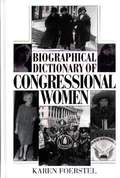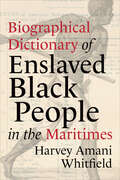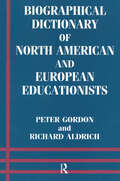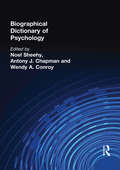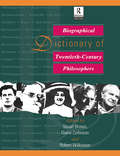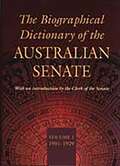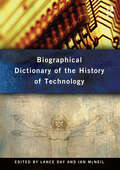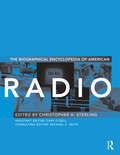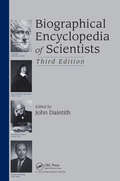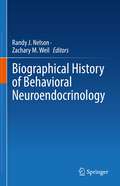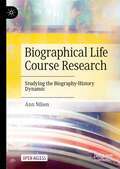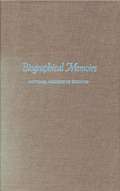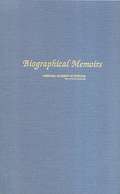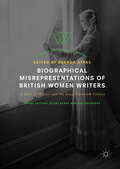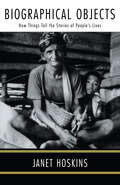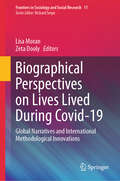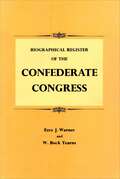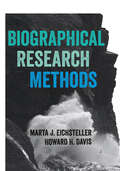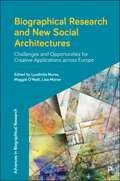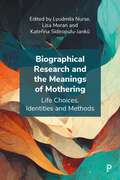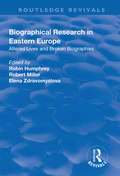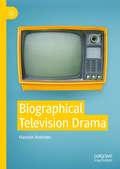- Table View
- List View
Biographical Dictionary of Congressional Women
by Karen FoerstelThis comprehensive reference guide to women who have served in Congress provides detailed biographies of each of the 200 women who have held office on Capitol Hill over the past 80 years.
Biographical Dictionary of Enslaved Black People in the Maritimes (Studies in Atlantic Canada History)
by Harvey WhitfieldThis important book sheds light on more than 1,400 brief life histories of mostly enslaved Black people, with the goal of recovering their individual lives. Harvey Amani Whitfield unearths the stories of men, women, and children who would not otherwise have found their way into written history. The individuals mentioned come from various points of origin, including Africa, the West Indies, the Carolinas, the Chesapeake, and the northern states, showcasing the remarkable range of the Black experience in the Atlantic world. Whitfield makes it clear that these enslaved Black people had likes, dislikes, distinct personality traits, and different levels of physical, spiritual, and intellectual talent. Biographical Dictionary of Enslaved Black People in the Maritimes affirms the notion that they were all unique individuals, despite the efforts of their owners and the wider Atlantic world to dehumanize and erase them.
Biographical Dictionary of North American and European Educationists
by Richard Aldrich Peter GordonThis is a guide to the lives and work of more than 500 Americans, Canadians and Europeans in the categories subsumed under the term "educationists". Entries are almost entirely restricted to those with main careers in the 19th and 20th centuries; none of the subjects is still living.
Biographical Dictionary of Psychology
by Noel Sheehy Antony J. Chapman Wendy A. ConroyThe Biographical Dictionary of Psychology provides biographical information and critical analysis of the influences and reception of over 500 people who have made a significant contribution to the field of psychology. Written by an international team of contributors, this volume charts the development of the practice of psychology worldwide from its emergence in the 1850s up to the present day. Biographies range from important historical figures to those who have had a more recent impact on the field, including: * Chris Argyris * Donald Broadbent * Kay Deaux * Leon Festinger * Sigmund Freud * Erich Fromm * Francis Galton * Eleanor Gibson * Doreen Kimur * Ulric Neisser * Jean Piaget * Herbert A. Simon * B.F. Skinner * Amos Tversky Entries are alphabetically organized and similarly structured for ease of access and allowing comparison of information. Introductory biographical details cover main fields of interest, nationality, principal appointments, honours, and places and dates of birth and death. This is followed by full bibliographic details of principal publications, as well as secondary and critical literature which provide a useful route into further research. Following on from there is an invaluable critical appraisal of the major achievements, influences and reception of the psychologists themselves. Thorough indexing allows the reader to access information by American Psychological Association subject division, key concepts, name and institution.
Biographical Dictionary of Twentieth-Century Philosophers
by Diane Collinson Stuart BrownA hefty dictionary of over 1,000 entries featuring brief biographies of the lives and work of influential philosophers during the 20th century. The editors have also included thinkers who perhaps would not be strictly considered "philosopher," but have nonetheless made important intellectual contributions (Hannah Arendt, Noam Chomsky, Umberto Eco, C.G. Jung, Julia Kristeva, Max Weber). Besides the comprehensive and consistent scope of the dictionary, the volume also features a bibliography for each entry, a glossary containing short accounts of the origins, development and features of the major schools, movements and traditions in philosophy, and cross referenced indices. Annotation c. by Book News, Inc., Portland, Or.
Biographical Dictionary of Twentieth-Century Philosophers (Routledge World Reference Ser.)
by Stuart Brown Robert Wilkinson DianThis Biographical Dictionary provides detailed accounts of the lives, works, influence and reception of thinkers from all the major philosophical schools and traditions of the twentieth-century. This unique volume covers the lives and careers of thinkers from all areas of philosophy - from analytic philosophy to Zen and from formal logic to aesthetics. All the major figures of philosophy, such as Nietzsche, Wittgenstein and Russell are examined and analysed. The scope of the work is not merely restricted to the major figures in western philosophy but also covers in depth a significant number of thinkers from the near and far east and from the non-European Hispanic-language communities.The Biographical Dictionary also includes a number of general entries dealing with important schools of philosophy, such as the Vienna Circle, or currents of thought, such as vitalism. These allow the reader to set the individual biographies in the context of the philosophical history of the period. With entries written by over 100 leading philosophy scholars, the Biographical Dictionary is the most comprehensive survey of twentieth-century thinkers to date.StructureThe book is structured alphabetically by philosopher. Each entry is identically structured for ease of access and covers:* nationality* dates and places of birth and death* philosophical style or school* areas of interest* higher education* significant influences* main appointments* main publications* secondary literature* account of intellectual development and main ideas* critical reception and impactAt the end of the book a glossary gives accounts of the schools, movements and traditions to which these philosophers belonged, and thorough indexes enable the reader to access the information in several ways:* by nationality* by major areas of contribution to philosophy e.g. aesthetics* by major influences on the thinker concerned e.g. Plato, Kant, Wittgenstein
Biographical Dictionary of the Australian Senate Volume 1
by Ann MillarThe Biographical Dictionary of the Australian Senate covers the period 1901–1929, the period in which the Parliament operated from Melbourne. This first volume provides short articles on Australia's Senators during the first thirty years of the Federal Parliament. These entries place particular emphasis on the events of a Senator's parliamentary experience, contributions to debates, committee work, parliamentary positions as well as ministerial appointments. It provides also a window on the colonial and post-colonial societies in which these ninety-nine Senators and their three Clerks lived and worked. It explains how miners, merchants, constitutionalists, soldiers, printers, trade unionists, adventurers and pastoralists became Senators, and how, in an essentially egalitarian society, they melded together as Australia's first federal parliamentarians. It tells of their work as legislators during a period when Australia was making a unique contribution to democracy itself, and reveals the excitement felt by conservatives and non-conservatives alike as they shaped the beginnings of an Australian nation. The contribution of these Senators to Australian public life was immense. The Federationists, Richard Baker, John Downer, Thomas Playford, Richard O'Connor, James Walker, Henry Dobson, William Trenwith, Simon Fraser, Josiah Symon and William Zeal retain some elemens of notoriety. Others, such as the South Australian farmer, William Russell, or Charles Montague Graham, a tailor on the Western Australian goldfields, were soon forgotten, even in their own time. The Biographical Dictionary of the Australian Senate reveals to a new generation the influence and the significance of men who came from all sides of politics and the social spectrum, and were able parliamentarians and true representatives of the democratic process. This readable and authoritative work of reference will provide readers with a biographical account of all Australian senators, and a history of the Senate since 1901. It makes a scholarly contribution to historical and parliamentary knowledge and fills many gaps in our knowledge of less well-known senators whose careers have not been fully documented before.
Biographical Dictionary of the History of Technology
by Lance Day Ian McNeilThis Biographical Dictionary seeks to put the world of technology in the context of those who have made the most important contribution to it. For the first time information has been gathered on the people who have made the most significant advances in technology. From ancient times to the present day, the major inventors, discoverers and entrepreneurs from around the world are profiled, and their contribution to society explained and assessed. Structure The Dictionary presents descriptive and analytical biographies of its subjects in alphabetical order for ease of reference. Each entry provides detailed information on the individual's life, work and relevance to their particular field. * in the first part of the entry, the information will include the dates and places of the subject's birth and death, together with their nationality and their field of activity * in the main body of the entry there follows an account of their principal achievements and their significance in the history of technology, along with full details of appointments and honours * finally an annotated bibliography will direct the reader to the subject's principal writings and publications and to the most important secondary works which the reader can consult for further information. Special Features: * The first work in existence to examine technologists in detail * Contains over 1,500 entries giving detailed information * Extensive cross-references enable the reader to compare subjects and build up a picture of technological advance^ * Figures drawn from fields such as Aeronautics, Telecommunications, Architecture, Photography and Textiles
Biographical Encyclopedia of American Radio
by Christopher H. SterlingThe Biographical Encyclopedia of American Radio presents the very best biographies of the internationally acclaimed three-volume Encyclopedia of Radio in a single volume. It includes more than 200 biographical entries on the most important and influential American radio personalities, writers, producers, directors, newscasters, and network executives. With 23 new biographies and updated entries throughout, this volume covers key figures from radio’s past and present including Glenn Beck, Jessie Blayton, Fred Friendly, Arthur Godfrey, Bob Hope, Don Imus, Rush Limbaugh, Ryan Seacrest, Laura Schlesinger, Red Skelton, Nina Totenberg, Walter Winchell, and many more. Scholarly but accessible, this encyclopedia provides an unrivaled guide to the voices behind radio for students and general readers alike.
Biographical Encyclopedia of Scientists
by John DaintithNew Edition of a Highly Regarded Reference As the first fully updated version in almost a decade, this comprehensive compendium brings together 2400 scientists who have made important contributions to the wide world of science. Rather than a Who's-Who style laundry list, this user-friendly resource provides essential biographical information and fo
Biographical History of Behavioral Neuroendocrinology
by Randy J. Nelson Zachary M. WeilBehavioral neuroendocrinologists are interested in the interactions between hormones and behaviors. This unique book tracks the development of behavioral neuroendocrinology from the first recognized paper in the field by Arnold Berthold in 1849 to the major contributors of the past century. It traces the history and development of the field by exploring the women and men who conducted the studies that revealed these hormone-behavioral relationships. Most chapters are written by the individuals who knew these pioneers best, and describe their stories and discuss the ways in which their work has shaped the field. Now is the perfect time for this book. The field is burgeoning and interest in the development of theoretical perspectives is thriving. Moreover, although this field was dominated by men early on, it has become a field with near sexual parity among its faculty, society membership, and leadership, and thus serves as an example of equitable science, training, and advocacy.
Biographical Life Course Research: Studying the Biography-History Dynamic
by Ann NilsenThis open access book explores an approach that connects individual and societal processes throughout history and shifting trends in sociological perspectives, influenced by C. Wright Mills’ theories of time and temporality. It traces its origins from American pragmatist thought and Chicago qualitative sociology in the early 20th century to the revival of biographical research in European and American sociology during the 1970s. The book shows empirical studies from this vibrant research approach can bridge methodological gaps between qualitative and quantitative biographical studies, applicable to various topics like class, gender, ethnicity, and intergenerational dimensions.
Biographical Memoirs: Volume 74
by National Academy of Sciences StaffMemoirs of histories more distinguished figures
Biographical Memoirs: Volume 91
by National Academy of Science the National AcademiesBiographical Memoirs is a series of essays containing the life histories and selected bibliographies of deceased members of the National Academy of Sciences. The series provides a record of the life and work of some of the most distinguished leaders in the sciences, as witnessed and interpreted by their colleagues and peers. They form a biographical history of science in America--an important part of our nation's contribution to the intellectual heritage of the world.
Biographical Misrepresentations of British Women Writers: A Hall of Mirrors and the Long Nineteenth Century (Palgrave Studies in Life Writing)
by Brenda AyresThis book is an investigation of the biases, contradictions, errors, ambiguities, gaps, and historical contexts in biographies of controversial British women who published during the long nineteenth century, many of them left unchecked and perpetuated from publication to publication. Fourteen scholars analyze the agenda, problems, and strengths of biographical material, highlighting the flaws, deficiencies, and influences that have distorted the portraits of women such as Lady Mary Wortley Montagu, Mary Wollstonecraft, Mary Hays, Sydney Owenson, Letitia Elizabeth Landon, Felicia Hemans, Elizabeth Barrett Browning, Caroline Norton, Elizabeth Gaskell, Charlotte Bront#65533;, Lady Florence Dixie, George Eliot, and Edith Simcox. Through exposing distortions, this fascinating study demonstrates that biographies are often more about the biographer than they are about the biographee and that they are products of the time in which they are written.
Biographical Objects: How Things Tell the Stories of Peoples' Lives
by Janet HoskinsFirst Published in 1998. Routledge is an imprint of Taylor & Francis, an informa company.
Biographical Perspectives on Lives Lived During Covid-19: Global Narratives and International Methodological Innovations (Frontiers in Sociology and Social Research #11)
by Lisa Moran Zeta DoolyThis volume elucidates international biographical and narrative perspectives on how COVID-19 influenced people’s daily lives across different countries and contexts. It draws together global interdisciplinary scholarly contributions and conceptualizes the lived life as a complex, multilayered and multidimensional phenomenon that is constantly unfolding both in and across time. Significantly, this volume focuses on seldom-heard groups including persons diagnosed with HIV, COVID-19 dissenters, prisoners, essential workers, waste pickers, refugees and migrants. The chapters focus on the pandemic's multifarious impacts on people’s lived realities in personal and professional domains, exploring the complexity of people’s relationships with family, friends, interactions with colleagues and students and the centrality of emotions, to everyday human experiences, including grief, loss and loneliness as well as moments of joy and processes of personal renewal. This volume explores innovative questions, issues and challenges on the development and utilization of rich, biographical narrative methodologies during COVID-19, addressing important issues like power and voice, and pragmatic questions of how to do biographic research whilst socially distant. Contributions to this work illuminate the multidimensionality of human experiences, adaptability to adverse circumstances and the complexity of working through unanticipated global events whilst reimagining novel social futures.
Biographical Register of the Confederate Congress
by Ezra J. Warner Jr."This is a very valuable reference work, the non-existence of which has long been deplored by Civil War historians. The research, which is impressive, has turned up a considerable amount of detail not generally known, even among Civil War specialists." -- Bell I. WileyThis vital addition to Civil War scholarship is an attempt to rescue members of the Confederate Congress from "postbellum obscurity." Modeled after Ezra J. Warner's two earlier books, Generals in Gray and Generals in Blue, the register contains an introduction describing the makeup of the Confederate Congress, biographical sketches of the congressmen, and a substantial bibliography.The biographical sketches include the place and date of birth, family background, education, means of libelihood, politics, public-service record, and degree of financial and political success of each congressman.The authors describe each congressman's participation in (or opposition to) secession and detail the circumstances of his election to the Confederate Congress. A prominent section of each sketch is devoted to the congressman's activities in the Congress: his position on major issues; his chief interest and the measures he sponsored; and the reason he left Congress. Then, the authors attempt to pick up the lives of the congressmen after the Civil War. The sketches include the place and date of death of each man, as well as the place of burial.Anyone interested in Civil War history will find Biographical Register of the Confederate Congress an indipensable aid.
Biographical Research Methods
by Howard Davis Marta J. EichstellerBiographical data provide unique insights into social life, but they also pose some significant challenges for social science researchers. This book offers a systematic, flexible guide to using biographical narrative methods in your research project. Drawing upon the authors’ own research, as well as case studies from a range of international contexts and disciplines, the book illustrates how biographical approaches can be tailored to different research questions and environments. This book will help you to: · Navigate any complexities or missteps when undertaking real-world research · Apply your analytical and research tools to your research question · Choose the right research design for your project, whether single or mixed methods · Ground your understanding within diverse real-world research examples. Clear, adaptable, and applied, this is your definitive guide to working with biographical methods.
Biographical Research Methods
by Howard Davis Marta J. EichstellerBiographical data provide unique insights into social life, but they also pose some significant challenges for social science researchers. This book offers a systematic, flexible guide to using biographical narrative methods in your research project. Drawing upon the authors’ own research, as well as case studies from a range of international contexts and disciplines, the book illustrates how biographical approaches can be tailored to different research questions and environments. This book will help you to: · Navigate any complexities or missteps when undertaking real-world research · Apply your analytical and research tools to your research question · Choose the right research design for your project, whether single or mixed methods · Ground your understanding within diverse real-world research examples. Clear, adaptable, and applied, this is your definitive guide to working with biographical methods.
Biographical Research and New Social Architectures: Challenges and Opportunities for Creative Applications across Europe (Advances in Biographical Research)
by Tamsin Barber Diana Yeh Magda Nico Ana Caetano Kateřina Sidiropulu-Janků Ciara Bradley Andre Epp Jakub Gałęziowski Sónia Bernardo Correia Anabela Pereira Lynsey Kavanagh Jerzy Stachowiak Fabienne Seifert Oksana ŽabkoThis volume focuses on the place of biographical research in shaping social futures and its creative applications in the new unprecedented societal circumstances caused by the COVID-19 pandemic. Written by experienced and early career biographical researchers, it demonstrates how biographical research responds to the new ‘social architecture’: theoretically, empirically and analytically.
Biographical Research and the Meanings of Mothering: Life Choices, Identities and Methods
by Lyudmila Nurse, Lisa Moran and Kateřina Sidiropulu-JankůWhat does mothering mean in different cultures and societies? This book extensively applies biographical and narrative research methods to mothering from international perspectives. This edited collection engages with changing attitudes and approaches to mothering from women’s individual biographical experiences, illuminating how socially anticipated tasks of mothering shaped through interlinking state, media, religious beliefs and broader society are reflected in their identities and individual life choices. Considering trust, rapport, reflexivity and self-care, this collection advances methodological practice in the study of mothers, carers and childless women’s lives.
Biographical Research in Eastern Europe: Altered Lives and Broken Biographies (Routledge Revivals Ser.)
by Robert MillerThis title was first published in 2003. The transition from socialism experienced by the countries of Eastern and Central Europe during the last decade has been recognised as a profound historical watershed. It is only now, however, that the meanings and dimensions of 'post-socialism' are becoming apparent. The use of the 'biographical perspective' in research provides a unique avenue for studying these changes. Biographical Research in Eastern Europe is the only edited volume that brings the work of many of the most advanced and active biographical researchers working on Eastern Europe together in one volume. The book is organized into four parts. 'The Potential of Biographical Research,' explores the methodological issues. Arguments for the appropriateness of the biographical approach as a humanistic perspective are put forward and emphasis is laid on its fruitfulness for research into everyday lives and for the study of identity construction with particular reference to transition. 'Communists, Informers and Dissidents,' deals with the structural features of Soviet regimes, with a particular focus on the problematic divisions between public and private spheres of life. 'The Impact of Social Change,' demonstrates the value of the biographical approach as an instrument for the study of social and cultural change. 'Exile, Migration and Ethnicity,' centres on the problem of constructing and maintaining ethnic identities under repression; a context that can be seen as disturbing life-trajectories and framing the life story. Covering a wide range of 'post-socialist' countries, the chapters are unified by a common research perspective and an informative introduction that identifies common themes across the selections.
Biographical Television Drama
by Hannah Andrews“Biographical Television Drama breaks new ground as, to my knowledge, the first book-length exploration of the terms in which television engages in biographical storytelling. Backed by robust research in biography studies and British television history, Hannah Andrews deftly unravels the complexities behind the accessibility of biographical television drama. Her book tackles key questions head-on, notably rhetorics and style, narrative and performance and, innovatively, ethics, while also shedding light on the interconnections with other biographical screen forms through a rich corpus. This is an essential critical study that vindicates television drama’s unique place in the histories and practices of screen biography.”-Belén Vidal, Senior Lecturer in Film Studies at King’s College London and co-editor of The Biopic in Contemporary Film CultureThis book explores what happens when biography and television meet, in a novel fusion of the two fields of study. Andrews compares core concepts in biography and television studies such as intimacy, the presentation of the self and the uneasy relationship between fact and fiction. The book examines biographical drama’s generic hybridity, accounting for the influence of the film biopic, docudrama, melodrama and period drama. It discusses biographical television drama’s representation of real lives in terms of visual style, performance and self-reflexivity. Andrews also assesses how life stories are shaped for televisual narrative formats and analyses the adaptation process for the biographical drama. Finally, the book considers various kinds of reputation – of the broadcast institution, author, biographical subject – in relation to the ethics of televisual biography.
